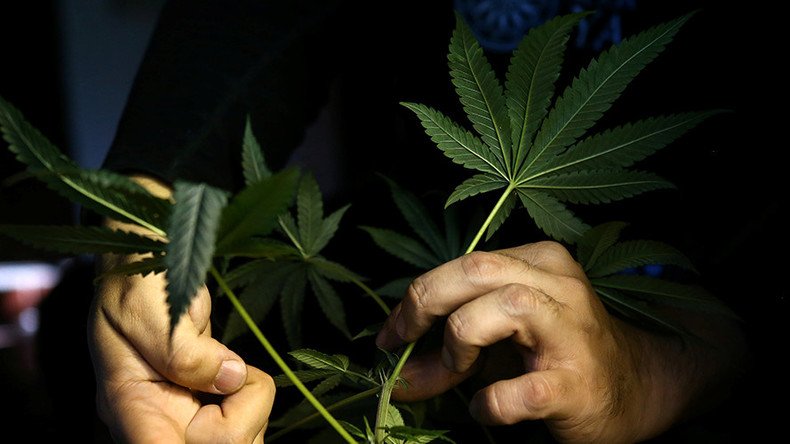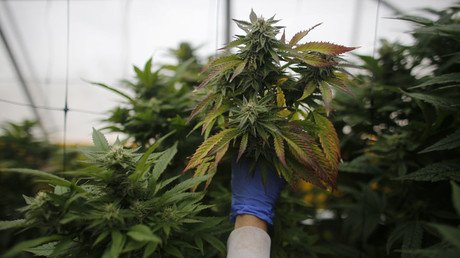Toke the good with the bad: Marijuana saves lives & alters brains, studies show

A new study finds the legalization of cannabis in Colorado was associated with “a statistically significant reduction” in opioid-related deaths. Another study shows that long-term use of marijuana changes the brain at a cellular level.
On Monday, researchers from Brigham Young University’s neuroscience department published a study in the journal JNeurosci that found long-term use of cannabis depressed gamma-aminobutyric acid (GABA) cell activity in the ventral tegmental area (VTA), which they said was “necessary for reward behavior with dopamine cells critically involved in reward signaling.”
In their study, researchers injected adolescent mice with THC, the psychoactive component of marijuana, and found that the drug triggers cellular-level changes in the VTA of teenage mice, making them dependent on the drug.
After one week of daily injections, researchers found that THC affected the function of GABA neuron cells in the mice, making it harder for them to reach the same high without the use of greater amounts of marijuana.
Mice that only received one injection did not show the same changes, leading researchers to conclude that persistent consumption of THC may affect the function of the brain over time.
“Marijuana use and legalization is a pressing issue for many states. Although marijuana is the most commonly abused illicit drug, the implications of legalized, widespread or continued usage are speculative,” one researcher wrote.
Twenty-nine states and the District of Columbia currently have laws legalizing marijuana in some form. California has legalized weed for recreational use, with markets set to open in January 2018.
Legal weed & the opioid crisis
The legalization of marijuana in Colorado has led to a 6 percent reduction in opioid-related deaths in the state, according to a new study published online last week in the American Journal of Public Health.
“After Colorado’s legalization of recreational cannabis sale and use, opioid-related deaths decreased more than 6 percent in the following two years,” said the team of investigators from the University of North Texas School of Public Health, the University of Florida, and Emory University concluded, according to the Washington Post.
The authors of the study said that the reductions in opioid-related deaths were related to “a reversal of the upward trend in opioid-related deaths.” However, they stressed that the results were only preliminary, given that they only studied data from the two years after recreational marijuana was legalized in 2014.
Using data from the Centers for Disease Control and Prevention’s (CDC) Wide-ranging Online Data for Epidemiologic Research (WONDER) to chart the number of opioid-related deaths each month from 2000 to 2015.
Recreational marijuana is saving lives in Colorado by reducing opioid deaths, study finds https://t.co/oDk4qu3NEx by @_cingrahampic.twitter.com/bJ1aL0nyim
— The Cannabist (@cannabist) October 16, 2017
From 2000 to the end of 2013, the study claims that Colorado saw a steady increase in the number of opioid-related deaths. According to the study, that trend was “reversed” in 2014, when Colorado legalized recreational marijuana.
This is the first study to look at the correlation between recreational marijuana and opioid deaths. The study states that their research “extends” on prior studies “on the potential protective effect of medical cannabis legalization on opioid-related deaths.”
Researchers isolated the effects of legalized recreational cannabis by comparing data from Colorado and Nevada, since both states legalized medical marijuana in the same year, but Nevada did not legalize recreational weed use until 2017.
Justice Dept. and DEA don’t see eye-to-eye on marijuana research & MS-13 https://t.co/LXeimzXYzLpic.twitter.com/bUaCv3JeVC
— RT America (@RT_America) August 17, 2017
Opioids killed more than 33,000 people in 2015, according to the CDC. Half of those deaths involved a prescription opioid.
The CDC does not include any statistics for marijuana-related deaths. However, it states that cannabis use can lead to addiction, and adversely affect brain health, lung health, heart health and mental health.
In their study, the researchers warned that even though they found health benefits from reducing the number of opioid-related deaths, they noted that “expanded legalized cannabis use is also associated with significant potential harms.”
“For policymakers to balance the potential beneficial and deleterious effects of these laws, researchers must continue to examine the full range of health effects in both clinic- and population-level research,” they concluded, according to WXYZ.













